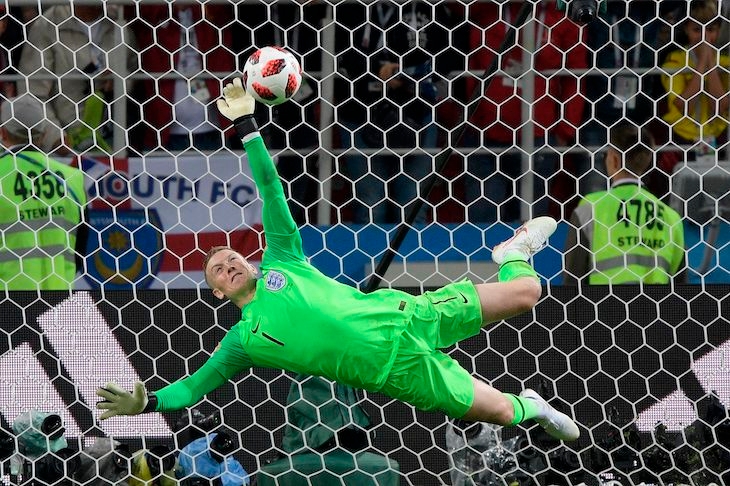Last week, for the first time since 1996, and for the second time in nine attempts, England won a match that was decided by a penalty competition. You may have read something about it.
The penalty shoot-out is the classic example — the type specimen — of a sport transforming itself for television. Television loves penalties because television loves drama. When drama is mixed with partisanship the mixture is irresistible: a perfect piece of entertainment.
Many sports have gone down the same route: changing their essence to please television, to create entertainment and ultimately to make more money.
It’s not always a bad thing. The tie-break in tennis was first used in 1965 on the professional circuit. It was introduced at Wimbledon in 1971, in delayed response to a match of 1969 in which Pancho Gonzalez beat Charlie Pasarell 22-24 1-6 16-14 6-3 11-9.
To win a tie-break (and therefore a set) you must lead by two clear points. In theory it can go on forever — so the essential rhythm of tennis is maintained. Tie-breaks have brought some classic passages of play, most famously the fourth-set tie-break in the men’s final of 1980: John McEnroe won it 18-16 only to lose the match to Björn Borg.
Many of these sporting changes are about hurrying the game up so that it fits more snugly into television schedules. Sport is by definition unpredictable: you really don’t ever know what happens next. Television prefers things that run to time — and preferably to times when you can maximise your audience. Sport has done its best to please: enraging those who try to combine live sport with Sunday train services.
The swimming finals at the Beijing Olympic Games of 2008 took place just after breakfast to catch America’s East Coast primetime. The heats were in the evening, so the athletes had to work against their own circadian rhythms. Rugby league became a summer sport in 1996 to avoid competition with the newly professional rugby union and fill holes in the schedules of satellite television.
Some sports have gone further and changed essential parts of their nature in the chase for audiences. Baseball came up with the designated hitter. The DH doesn’t field, he just bats instead of the pitcher, who is usually pretty poor with the bat. The idea is more home runs, more entertainment, more thrills. The American League has played with a DH since 1973; the National League rejects the concept. Debates on the issue are about the soul of sport: is sport a form of entertainment? Or is sport something higher — something that is incidentally entertaining?
The US National Basketball Association introduced a shot clock in 1954: if you don’t get a shot off within 24 seconds of winning possession, you must give the ball to the opposition. In other words, possession-based play was outlawed: lots of shots, lots of scoring.
In 2009 the modern pentathlon decided to become a modern tetrathlon when the shooting and the running competitions were combined, so that you run for a bit, blast off a few shots and then run some more. The sport had already changed to become a single-day event; and that was probably a good thing, making for a very intense competition. The idea to sex it up further has looked merely desperate.
Gymnastics and skating both changed their scoring system. There is no longer a perfect score from which deductions are made; the scoring is now open-ended, reflecting the number and the difficulty of the tricks correctly performed. This has made for better gymnastics, with the play-safe element less profitable. In skating the more elegant skaters are penalised: the woman who lands the triple axel will beat the dying swan every time.
No sport has performed more spectacular and more painful gyrations before the gods of television than cricket, the incredible shrinking game. The five-day Test match was once the highest form of the game. Then they tried 65 overs, then 60, then settled at 50. Too long! Now there are 20-over competitions all over the world, and that’s supposed to be the future of the game. Or is it too long? The England and Wales Cricket Board plans to introduce a competition of 100 balls only.
Cricket now has fireworks going off at the slightest provocation, distressingly sudden bursts of loud music and rather embarrassing dancers — even while the players mostly agree that the most demanding form of the game, the one most likely to produce genuine sporting excellence, is five-day Test match cricket.
Is it sport’s duty to provide entertainment and make money? Or does sport have a loftier duty: a duty to the genuine pursuit of pure excellence? Sport is trivial, God knows, but the pursuit and capture of excellence in any form can never be a wholly trivial matter.
And that’s the problem with the penalty shoot-out: it’s not about footballing excellence. It’s a manufactured thing, designed to create cheap drama. Football is about movement, corporate effort, improvisation, invention, doing things on the fly. A penalty shoot-out is a static competition between individuals. The idea is to place an unfair load of responsibility on the players and watch them suffer. Great television: but anti–football, anti-excellence and therefore, anti-sport.
Alas, it seems we are stuck with it. The shoot-out was first used in Britain in 1970, and the first time at the World Cup finals in 1982. Football matches of immense sporting importance are now routinely decided by something other than football — something contrary to football. But hell — isn’t it dramatic?
It seems that every sport is trying to create sport for people who don’t really like sport. The pursuit of excellence is getting phased out. When that’s gone, what’s left?






Comments